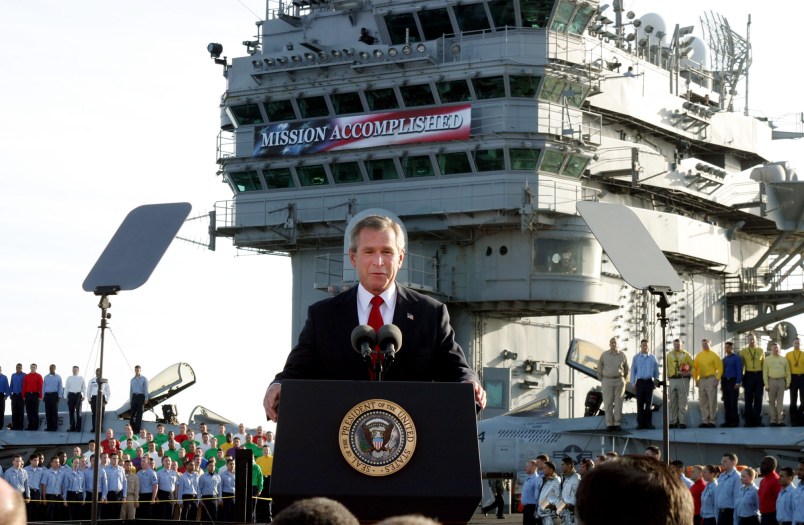Commentators seem to agree that once the early Trump/World Wrestling phase of last night’s debate ebbed it moved on to a more substantive discussion from which Trump was largely absent. That may be so. Trump may have been silent because he just doesn’t now enough details or doesn’t care enough about them to engage. But there was a far more consequential reality that largely escaped attention. The debate turned not so much to foreign policy as to each candidate trying to outdo the other in embracing the sort of petulant unilateralism that made the aughts such a disaster for the United States.
It was, to put it simply, a race to embrace Bush foreign policy on steroids.
Let’s start with Marco Rubio, who has tried to carve out a space as the candidate of the neoconservatives in exile. Joe Klein saw him as the clear winner of the debate with a crisp and incisive command of national defense policy. “To my mind, Marco Rubio won that debate with his obvious fluency on a range of topics … Marco Rubio is becoming a force to be reckoned with—on the debate stage. He is fluent, smart and bold.”
That is not what I saw at all.

I agree that Rubio continues to come off as likable and he makes no obvious mistakes in these encounters. I actually think that just by dint of process of elimination he has a substantial better shot at the nomination that most people realize. But in his recitations on foreign policy he doesn’t come off as knowledgable or seasoned. He comes off as someone who has obligingly internalized, in a kind of rote manner, the wisdom of Bill Kristol to get the money of Sheldon Adelson. There is a strong DC insider appetite for these nostrums. So it’s not just the money. But these are dangerous, discredited ideas that were tried and failed miserably under the last Republican President. Indeed, they failed so miserably that even in President Bush’s second term the standard-bearers were largely ushered aside in favor of a slightly more realist approach to cleaning up the messes created in the first term.
If there is one thing the country does not need it is another impressionable foreign policy neophyte who comes under the influence of this war-addicted DC coven.
Next is Carly Fiorina. I entirely agree that she had a strong, commanding debate. She seemed particularly focused and knowledgable on national security questions as she rattled off a number of things she would do to take a more aggressive posture toward America’s adversaries and rivals.

Unless of course you actually have any idea what you’re talking about. In which case, the things she said seemed quite different. At a broad level, it’s the same kind of confrontational and dangerous foreign policy that got the country into trouble a decade ago. But as Ezra Klein explains here, Fiorina’s list of proposed actions were a mix of things that were irrelevant to the questions at hand, are already happening, or things that operate on a time scale such that they can’t have any real affect on the challenges she suggests they’re aimed at countering. The dangerous ground of half-knowledge. Or policies as puzzle pieces with no larger picture or understanding.
The upshot is the same – quick studies who’ve imbibed a lot of talking points but dish them out in a way that shows a high nominator of promised impulsive aggression over a small denominator of experience, knowledge or considered views. A John McCain may have foreign policy ideas and impulses you don’t like. But he more or less had the same ones last year and a decade ago. They’re not being fed to him like a puppet.
The attitude of embattlement and grievance that currently animates the Republican party is something we’re quite familiar with in the domestic sphere but it’s even more present in the outlook abroad. It is a dangerous thing to take a coalition which feels embattled, victimized and disempowered and put them in charge of the most powerful military in the world. A coalition like that, with an untrained hand at the helm, guided by terrible advisors is a recipe for disaster.






